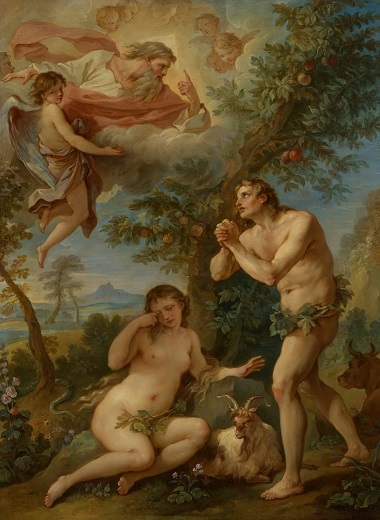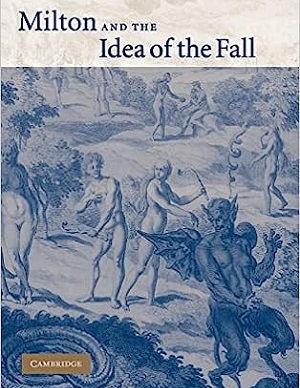
The Rebuke of Adam and Eve by Charles Joseph Natoire.
Creating Conversation is a weekly editorial, curated by the Centre for Missional Leadership (CML), which gives opportunity for people to speak about issues they believe are vital for the church in Vancouver.
One of the goals of this weekly article is to spark dialogue – and action. We invite you to join the dialogue here on the Church for Vancouver website.
We also invite you to use the article as a discussion starter with your small group, church staff, friends and your neighbours. Thanks for participating in the conversation!
How we see matters. The words we use to think and converse, the metaphors which shape our perceptions, our outlook, matter.
The lenses through which we perceive the city and our neighbourhood, through which we view the churches and ministries that strive to make a difference, determine what we see and then how we engage in the life of our city.
I came across two recent publications which feature chapters on “The Fall” in one case, and on “The Fall from Grace” in the other. Once again I wondered why many followers of Christ still view our place in God’s world through that metaphor. There are other Christians for whom the Fall, and the related concept of original sin, are not part of the framework by which they make sense of things. I believe both positions are problematic.
We do need to make sense – somehow – of why or how humanity is both troubled and troubling. Avoiding that issue doesn’t help. Seeing it in terms of a Fall – either the Fall of humanity or a fallen world, by way of the disobedience of our original ancestors – is probably even worse. It affects our vision as if we had cataracts!
I have been wondering about this for a long while. It began when I noticed that, in my NIV Bible, Genesis, chapter 3 has the heading, “The Fall of Man (sic).” When you read the chapter, you find a conversation, an action, consequences; but nothing about a fall. The main thing in that text is that eyes are opened; in other words, the story is about how we see. (See above.)
When I have asked people if “the Fall” is a biblical concept, I almost always got the response, “Of course.”<
When I then asked where in the Bible I would find this concept, I was told, “Genesis, chapter 3 and Romans chapter 5.” So I carefully read that chapter in the letter to the church in Rome. Again, no reference to a fall or to falling. Curious, isn’t it? Why do we read this metaphor into these texts?
When I had assured myself that neither Genesis nor Romans said anything about a fall, I scoured the whole biblical text for instances of falling (or any downward motion). And, yes, since we live in a world ruled by gravity, there is plenty of literal falling (rain and other forms of precipitation, for instance) and figurative uses of the notion: there are warriors falling in battle and people falling down in worship – to mention just a few.
There is, admittedly, also Jesus saying, “I saw Satan fall like lightning.” But Satan is not Adam. And so, scratching my head, I began to look further afield. The doctrine of the Fall, while being mostly successful in hiding its origins, did leave a meagre paper-trail.

Saint Augustine played a part.
It turns out that this idea entered theological discourse in the 4th century, around the time of Saint Augustine, who engaged valiantly with current gnostic heresies which held that reality was divided into an upper, spiritual, good realm and a lower, bad realm of matter. Furthermore, it was seen that humanity had fallen from this upper realm of grace into sin and corruption.
This tiered view of reality was then given dramatic expression in Dante’s Divine Comedy, reinforced by Milton, and became so deeply embedded in the psyche, not only of Christianity but of Western thought as a whole, that now many insist that it is true and biblical. If you look for it, you can find traces not only in theology, but also philosophy and the arts.
There are those who argue that, while the Fall is not a biblical concept, it has become a useful notion, a kind of shorthand for what is ‘wrong’ with humanity. There is also the argument that there are other ideas and practices we embrace which are not biblical, from the trinity to Christmas trees. I hope to convince you that the ‘Fall’ is not only non-biblical, it is actually anti-biblical.
Some very important things ‘come down from heaven’ in our scriptures: manna, the bread from heaven (which the people had to bend over to pick up off the ground); the Son of Man (who became enfleshed, who demonstrates that matter matters, that spirit is expressed in and through matter); the city of God (which is the promise of final union of heaven and earth). There is also the grain of wheat that must fall into the soil in order to bear fruit.
Generally, when human beings go against the life-giving and life-promising ways of God, pride (or arrogance) is involved, pride expressed as upward motion, reaching above oneself, being ‘uppity.’ And we are told that ‘pride comes before a fall.’ But isn’t that a good thing? We are brought low where we belong since we, Adam (the human one), is made from adamah, soil. English, too, connects ‘human’ with ‘humility’ and ‘humus.’
 Down is where we find grace. Or, perhaps better still, if we want (or need) to think in terms of up and down, grace flows down; grace is that ever-flowing river from the heart of God.
Down is where we find grace. Or, perhaps better still, if we want (or need) to think in terms of up and down, grace flows down; grace is that ever-flowing river from the heart of God.
Didn’t Jesus like to hang out with those at the bottom of society’s (empire’s) ladder? Doesn’t he affirm that God’s mercy is like the rain and sun which fall on the good and the bad alike?
The story in Genesis 3 warns us – we being (in) Adam – not to eat of the fruit from the tree of the knowledge of good and evil. What does this mean? Perhaps it means more than one thing; but it certainly means that we should not judge things in terms of good and evil.
We live in a world of binaries (up/down, day/night, winter/summer, left/right); that is a feature of God’s good creation. We are ever tempted to associate or assign value to one of these terms. Up is seen as good, for instance. Right is good; left is gauche or sinister. And so on.
The story tells us, ‘Don’t do that.’ Jesus, in the Sermon on the Mount, picks up the theme, “Don’t judge; be merciful like your Father in heaven.”
In other words, to think of a ‘fall from grace’ gives us permission to continue eating from that forbidden tree. Score one for the serpent!
If this doctrine or belief is part of our mindset, the lens through which we see reality, it will affect how we see our city and our urban concerns and issues. It will skew how we think of rich and poor, east and west, the downtown core and the rest of the city, the city itself and suburbia. It also affects how we think about creation, about the environment. Is this dualistic thinking not also behind or underneath the oppositional and adversarial climate of our current discourse?
There is a final question which intrigues me. Why did the non-biblical notion of a fall from grace manage to become so deeply rooted in humanity’s psyche? Is it because of our upright posture and the fact that we locate ourselves (our selves) in our head? This is certainly worth pondering. And perhaps that is where we need to begin our search for what troubles us.
Dear reader, may grace continue to fall on you. May you find yourself falling into the embrace of grace.
Rudi Krause is a settler on Musqueam territory in Vancouver and parishioner at Saint Mary’s Anglican Church in Kerrisdale. Father and grandfather. Teacher (supposedly retired) and learner. Pilgrim and seeker. Urban farmer and forager. Poet and story-teller. Human becoming.
